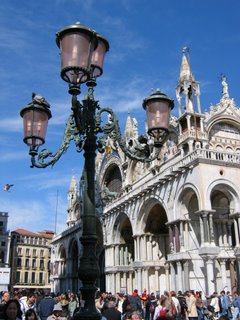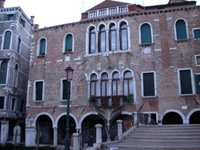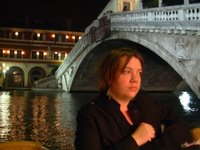Italy Complete Record: Day Two

10:15am
The
We pull our suitcases outside to smoke a cigarette beside the taxi lane and watch the all of the following pass, in succession: Two nuns in full habit, four young men in Italia soccer jackets with complicated hair, a glamorous middle aged woman with Cat’s Eye sunglasses, high heels, two dogs, and a fur coat, a Marlon Brando lookalike in a long black dress coat and a black suit, and finally, a tall, black-haired, blue-eyed guy in what looked like surgical scrubs and a track jacket, who approaches with some measure of feline grace and asks for a light. Easily one of the hottest guys I’ve ever seen. After thanking us politely, he darts off into the parking lot, leaving Anna and I to sit stunned into silence on the bench.
“Wow,” I say.
“Wow,” says Anna. “Bad pants, but, Wow.”
“You figure they hire that guy as a greeter? Like, “hey, welcome to
“Wow,” says Anna.
“Also the nuns and the fashionistas and the Sofia Loren look alike and the Mafioso looking dudes. Do you think the Italian tourism board pays these people to walk around the airport, play the stereotypes, and amuse the travelers?”
“Wow,” says Anna.
“So this is
Anna shakes her head. “That guy? So fucking hot.”
*****
11:45 am
It’s drizzly, quite foggy, and a little cold. We’re standing about a half a mile from the terminal on a covered dock, floating on the murky green water of the Lagoon, waiting for the waterbus with an eager English teenager[1] and his white-haired dad. I’m feeling a little high at present (it’s now almost 5 am, my time), a condition not aided by the ceaseless rocking of the dock and the occasional glimmer of blinding white sunlight through the fog. I close my eyes and hallucinate a sea serpent.
When the boat shows up, about fifty people converge out of nowhere to join us on our ride across the Lagoon. The guys on the boat are affable enough, drinking coffee from a novelty mug featuring a pair of breasts and what I imagine must be a cheesy joke in Italian. They steer with no great precision using a polished wooden captain’s wheel which looks like it was stolen of an 18th century pirate sloop and attached with superglue to the metal dashboard.
I lean my head against the window as we pass through a colonnade of elaborate buoys and rock jetties, each topped with signs that look to have been painted about a century ago (at least). These markers are each topped by a single fat seagull—as if part of the gimmick—as we pass through the brightening mist. I halfway anticipate a pirate attack by the time we round past an island housing a villa and an enormous cemetery. Sunlight starts creeping through as we pass the
Crossing the gra ndest part of the grand canal in a near golden fog—the outline of the distant domes and towers rising out of the mist—I feel like I’m sailing into a Henry James novel or some strange, Italian Avalon that emerges from the haze sporadically to seduce the stray visitor into some decadent alternate reality. Wouldn’t be so bad, I think, as we round into the
ndest part of the grand canal in a near golden fog—the outline of the distant domes and towers rising out of the mist—I feel like I’m sailing into a Henry James novel or some strange, Italian Avalon that emerges from the haze sporadically to seduce the stray visitor into some decadent alternate reality. Wouldn’t be so bad, I think, as we round into the
We disembark at the far end of Piazza San Marco, just to the right of Harry’s Bar, and drag our now damp and heavy suitcases over a narrow waterside sidewalk abutted on both sides by market stalls selling Carnevale masks and Italia warm-up jackets. We pass a block of pay-to pee toilets and round the first edge of waterlogged sidewalk cafes to pass beneath the columns at the edge of the square. I give a nod up to Triton, standing on what appears to be a crocodile, and the friendly looking griffin with the fat paws as we merge into the crowd of tourists in front of the Cathedral.
Well past the point of standard exhaustion, wet from the rain, yet uncomfortably warm, Anna and I convene on the overturned pallets the Venetians use for walkways when the square floods at high tide for a cigarette break and a map consult. It starts raining harder even before I manage to light the cigarette with the now damp, globetrotting matches from Orange County Social Club. Hordes of tourists rush in the direction from which we have come to the Vaporetti stop, the rest huddle in awkward clutches under awnings and clear plastic ponchos of the
(Probably not coincidence . . . just saying)
At the end of the day, though,
It is my idea to brave the rainy streets with a crude map and find our hotel on foot. It's not the best one. The shower has picked up considerable strength since we landed and we slog through with miniature travel umbrellas past crowds cowering under the awnings of jewelry shops and tourist traps. Schlepping a oversized suitcase through the alleys and over the white marble bridges of
And, as usually happens in these scenarios, about five minutes later we arrive at our hotel.
Antico Doge is the former residence of the mayor of
I worry that I accidentally booked the suite.
Anna puts it well.
“Shit, this is nice.”
High polished hardwood floors, gold silk brocade walls, crystal chandeliers.
“Italian MTV,” says Anna.
“Bidet!” I say. “Mini-bar!”
Anna opens the drapes to unlatch the seven foot tall windows. “Interesting alley views!” (Not the suite)
There’s a stairwell leading upstairs to a loft with a queen size bed. Downstairs there’s a twin size bed fitted as a sofa. Both (we will learn) are hard as rocks.
Slightly reenergized by our successful hotel room conquest, we leave the hotel to buy a phone card from the tobacco store across the campo. The guy running the place is chaming, though I findthat all the Italian I’d tried to learn disappears as soon as I tryto speak it. I buy a cigarette lighter and Anna and I walk deeper into Canareggio to sit on the edge of an empty fountain and smoke a cigarette.
On about the third drag, I slide on my sunglasses (the clouds are finally clearing), and woozily turn to Anna: “I think I’m either going to pass out or die.”
Though Anna insists she isn't tired, she agrees to put off further exploration until after a nap. We stroll back to the hotel, I slog up the steps to the loft, and without even bothering to take off my clothes, fall asleep in about five minutes.
*****
The nap you take after crossing the
Such is the case our first afternoon in
“We should eat something,” I say, opening my suitcase.
She groans in protest.
“Seriously.” I pull a clean shirt from the pile and a pair of heavy rhinestone earrings to trick me into believing I look clean, attractive, and well-rested. By the time I’m dressed and out of the bathroom, Anna has watched enough of Italian MTV to compare it favorably to American MTV.
“They play way better videos here,” she says.
In other words, they actually play videos here.
I flip through the channels while she dresses. We drop the key with the concierge and take off into the darkened streets.
*****
Our first meal in
Over at the 
Anna yawns.
We pay the bill, check our email at the arcade beside the hotel, and go to bed.
[1] I hesitate to use the word “dorky,” but that’s probably closer to the truth.
[2] This logic is not as appealing as it once was. By all reports, the permanent population of
[3] On a personal note, I found myself thinking about
[4] It occurs to me sometime later that he was probably in the military.
[5] He works at Brasserie Lipp on Blvd St. Germain in Paris. Eat there just so he can serve your food, make snide comments about your face or family members, and allude to his plans for world domination. I (and I say this without irony) absolutely adore him.

0 Comments:
Post a Comment
<< Home